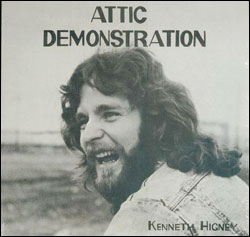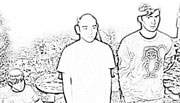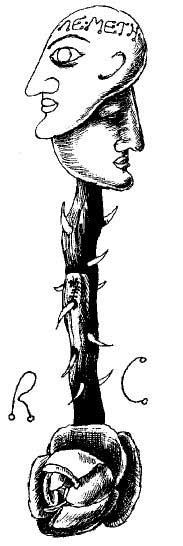Let us now sing the praises of intrepid record collectors. Sure, they are crazy, nerdy, obsessive freaks (I should know, I used to be one). But in many ways, these guys (and they are mostly guys) drive the reissue market, which is of great interest to me since many of the most interesting records this year have been collections of old, weird shit.
If it weren’t for the high collector-scum demand engendered by Kenneth Higney’s awful private press album, for instance, he never would have reissued it himself on his own Kebrutney label, and that would be a true shame. Out of tune, out of tempo, and out of step with anything else happening in music at the timeor at any other time, now that you mention itHigney’s bizarre Attic Demonstration (Kebrutney, $18.95) was originally pressed by the artist himself in hopes of getting others to cover the songs, but it’s startling to think anyone would even be able to play this stuff. The bumbling “Rock Star” sounds like Chrome on quaaludes trying to cover a song by the Godz. And “I Wanna Be the King” is as misguided an attempt at punk rock as the punk band Ponch joined in that old CHiPs episode. Higney actually sings, “I like being a punk, I like playing guitar/I hate the sissy music of John Denver”as if that near rhyme somehow would endear him to jaded CBGB patrons. Whatever: It endears him to my heart, for who among us has not tried desperately to fit in, only to be shut out?
The rarest record of this batch to finally see release is the Moondog and His Honking Geese Play Moondog’s Music EP (Moondog, about $15). Originally released in an edition of 100 in the early 1950s, it was sold on the streets of Manhattan by the infamous composer and street performer himself. Moondog was an affable blind man with a long beard and handmade leather poncho who clutched a large staff and various funky-looking instruments, making his living by performing on the streets from the late ’40s well into the ’60s. He befriended Leonard Bernstein, Marlon Brando, Julie Andrews, Diane Arbus (who snapped him several times), and Charlie Parker. It’s hard to think of a homeless man befriending the best, brightest, and most famous today, but Moondog’s big secret was that his music was, and is, totally accessible. These four rough-and-tumble numbers, arranged for saxophone and percussion, are among his most rollicking and jazzythe closest he gets to Sun Ra territory. Interwoven melodies float atop shuffling, Native American-influenced beats, vaguely recalling the circus, bebop, and medieval music.
“I crave cocaine but I can’t find nothing here in Atlanta/’Cause them hippies done used it all up!” I like to think of myself as a fairly intrepid crate digger, especially when it comes to raw, weird blues music, but neither I nor anyone I know had ever heard of “one-man band” Abner Jay until this year, when the Swedish reissue label Subliminal Sounds released One Man Band ($38.29), a best-of disc culled from small label LPs made in the ’60s. Jay is an anomaly in every sense. One of the last recording performers from the days of minstrel shows, he played an electric six-string banjo, began most every song with a series of off-color jokes, and played the snare with one leg and the kick drum with the other. This South Georgia native’s picking style was swampy and bluesy, while he used his voice in an extended, powerful moan to talk of the difficulties of sharecropping, hard drugs, and Vietnam. It’s safe to say you’ve never heard anything like it.
Among collectors of sanctified blues and raw old-school African-American gospel, the name Kevin Nutt is synonymous with “the good shit.” The Alabama resident hosts a great radio program every week called Sinner’s Crossroads on New Jersey’s free-form radio station WFMU (www.wfmu.orgcheck it out, it makes KEXP sound like the Mountain). He’s got a knack for finding amazing stuff, often coming up with modern musicians who make archaic, heavy sounds you’d swear had vanished 50 years ago. Nutt recently partnered with the Brooklyn-based jazz label Aum Fidelity to start CaseQuarter, whose mission is to “make accessible contemporary and historical gospel and sacred recordings, both commercial and informal.”
CaseQuarter’s first release, God’s Got It ($15.98), was culled from small-run 7-inch records made in the ’70s and ’80s by one Rev. Charlie Jackson. It’s very raw, Delta-bluesy, explosive gospel. You don’t hear sanctified blues like this very often, much less made this recently, and it’s every bit as good as the touchstones of this great, largely unknown music: Sister O.M. Terrell, Rev. Utah Smith, Rev. Lonnie Farris, and Rev. Louis Overstreet with His Sons and the Congregation of St. Luke’s Powerhouse Church. Every song burns hot, but the title track’s so earth-shatteringly raw, it’s like your favorite punk-rock song only with much more joyful lyrics. The vocals happily distort, the churchgoers are going nuts in the background, there’s this loud and raunchy guitar that sounds like an electric snake, and it’s just impossible to sit still while listening to this. I double dog dare you.








